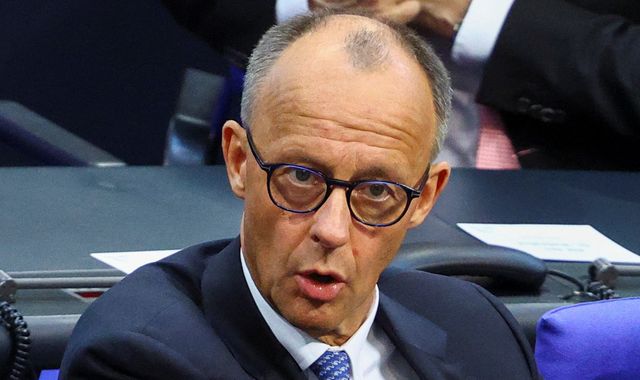
Friedrich Merz's bid to become Germany's next chancellor has unexpectedly failed in the first round of parliamentary voting.
Mr Merz, leader of the country's CDU/CSU conservatives, is hoping to become the 10th chancellor since the end of the Second World War.
Since then, no previous candidate has failed to win on the first vote.
Needing a majority of 316 out of 630 votes in a secret ballot, he received 310 - falling short by just six votes.
He had been expected to win comfortably after securing a coalition deal with the centre-left Social Democrats (SPD).
The result means at least 18 coalition MPs failed to back him.
Parties will now regroup to discuss the next steps. Another vote could be held later on Tuesday, though the Frankfurter Allgemeine Zeitung and Zeit newspapers said that had been ruled out.
The far-right Alternative for Germany (AfD) party said it was prepared to take part in another ballot on Wednesday.
"We will not stand in the way of a second round of voting tomorrow," Tino Chrupalla, the party's co-leader, said on German television.
AfD leader Alice Weidel said on X that Merz's failure to secure a majority showed the "weak foundation" on which his coalition was built, adding that it had been "voted out by the voters".
Bodo Ramelow, vice president of the Bundestag and a member of the Left Party also backed a swift resumption, saying he hoped another parliamentary session would be held on Wednesday.
Mr Merz, 69, can run again, but others can also enter the fray.
The lower house of parliament - the Bundestag - has 14 days to elect a candidate with an absolute majority.
There is no limit to the number of votes that can be held within the two-week period.
If no one emerges as the winner, the German president can appoint the candidate who wins the most votes as chancellor, or dissolve the Bundestag and hold a new national election.
Whoever is elected as chancellor will have to decide what to do about the AfD.
Mainstream parties have refused to work with it. A "firewall" against collaborating with strongly right-wing parties has been in place since the end of the war.
During federal elections in late February, the AfD scored its best-ever result while Chancellor Olaf Scholz's SPD dropped to about 16%.
The AfD is the second largest party in the lower house of the Bundestag and was officially designated as extremist last week by Germany's domestic spy agency.
The new chancellor's in-tray will also include the Ukraine War and global tariffs imposed by US President Donald Trump.

(c) Sky News 2025: Friedrich Merz's bid to become Germany's 10th chancellor unexpectedly fails in first round


 Two motorbike racers killed in 11-bike crash during British Supersport race at Oulton Park
Two motorbike racers killed in 11-bike crash during British Supersport race at Oulton Park
 Wagatha Christie: Vardy agrees to pay almost £1.2m of Rooney's legal costs
Wagatha Christie: Vardy agrees to pay almost £1.2m of Rooney's legal costs
 Donald Trump denies posting AI image of himself as pope
Donald Trump denies posting AI image of himself as pope
 Sudanese man separated from his family by war and wounded by a stray bullet, returns home after two years
Sudanese man separated from his family by war and wounded by a stray bullet, returns home after two years
 Should some women offenders be spared jail? Female inmates reveal impact of prison
Should some women offenders be spared jail? Female inmates reveal impact of prison
 Radiohead star Jonny Greenwood hits out at 'censorship' and 'intimidation' after shows cancelled following 'credible threats'
Radiohead star Jonny Greenwood hits out at 'censorship' and 'intimidation' after shows cancelled following 'credible threats'
 Kemi Badenoch 'confident' she will lead Tories into next election - despite local results
Kemi Badenoch 'confident' she will lead Tories into next election - despite local results
 Boy, 13, dies after jumping into canal
Boy, 13, dies after jumping into canal







